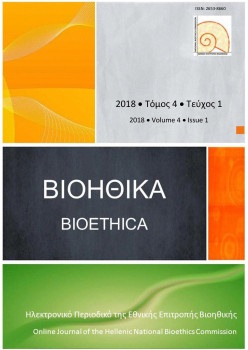CRISPR/CAS και η επέμβαση στο ανθρώπινο γονιδίωμα: περί φύσης και έξης
Abstract
Οι εξελίξεις στις βιολογικές επιστήμες προχωρούν με ταχύτατους ρυθμούς. Οι μέθοδοι παραγωγής μαζικών βιολογικών δεδομένων έχουν οδηγήσει στην ανάγκη νέων μεθοδολογιών ανάλυσής τους. Ταυτόχρονα, όμως, έχουν δημιουργήσει νέες προκλήσεις αναφορικά με τον τρόπο διαχείρισης της γνώσης αυτής και των πιθανών βιοηθικών συνεπειών της για τα έμβια όντα.
Το επόμενο βήμα στην πρόοδο στις βιολογικές επιστήμες, ήρθε με τη μέθοδο CRISPR/Cas9, η οποία επέτρεψε την επιλεκτική τροποποίηση του γονιδιώματος. Η μέθοδος αυτή διακρίνεται από απλότητα, αποτελεσματικότητα και ευελιξία, κάτι που διευκολύνει εξαιρετικά την τροποποίηση του γονιδιώματος οργανισμών συμπεριλαμβανομένου και του ανθρώπινου. Η μέθοδος αυτή αποτελεί το πιο εντυπωσιακό επίτευγμα μιας πορείας διαρκούς προόδου στην τεχνολογία της βιολογικής μηχανικής την τελευταία δεκαετία. Παρά το ότι ήδη εφαρμόζεται ευρέως σε όλα τα είδη, το ενδιαφέρον της εφαρμογής της επικεντρώνεται στον άνθρωπο. Στην παγκόσμια βιβλιογραφία σε αρκετές περιπτώσεις υπάρχει έντονη αντιπαράθεση και τίθεται η σύγκριση των νέων τεχνολογιών με μεθόδους παλιάς ευγονικής κάτι το οποίο προσδίδει στις μεθόδους αυτές αρνητική χροιά. Αντιθέτως δεν λείπουν και οι αισιόδοξες οπτικές που βρίσκουν τις μεθόδους αυτές σωτήριες για την ανθρώπινη εξέλιξη. Στόχοι της παρούσας εργασίας είναι να διατυπώσει και να στηρίξει τη θέση, ότι η ηθική αξία των πραγμάτων δεν είναι στη φύση τους αλλά στην έξη του χρήστη, να δώσει αφορμή για περαιτέρω προβληματισμό, να συζητήσει τα βιοηθικά θέματα που προκύπτουν από την εφαρμογή της τεχνολογίας αυτής και φυσικά να τονίσει πως όποιες και αν είναι οι επερχόμενες εξελίξεις της γενωμικής οφείλουν να προάγουν και να ωφελήσουν το άτομο.
Επιπροσθέτως κρίνεται απαραίτητη η διαρκής και συνεχής διαβούλευση μεταξύ της επιστημονικής κοινότητας και του ευρύτερου κοινωνικού συνόλου. Τέλος, καταλυτικής σημασίας είναι η χάραξη νέων πολιτικών και η επικαιροποίηση των κατευθυντήριων οδηγιών, καθότι έτσι διαφυλάσσεται ο σεβασμός στην ατομική ύπαρξη.
Article Details
- Zitationsvorschlag
-
Χασαπάκου (Dionysia Chasapakou) Δ., Προϊκάκη (Stella Proikaki) Σ., Μπόμπολα (Maria Bobola) Μ., & Λάμπρου (George Lambrou) Γ. (2018). CRISPR/CAS και η επέμβαση στο ανθρώπινο γονιδίωμα: περί φύσης και έξης. Bioethica, 4(1), 28–39. https://doi.org/10.12681/bioeth.19696
- Ausgabe
- Bd. 4 Nr. 1 (2018): Bioethica
- Rubrik
- Original Articles
Authors who publish with this journal agree to the following terms:
- Authors retain copyright and grant the journal right of first publication with the work simultaneously licensed under a Creative Commons Attribution CC BY 4.0 License, which allows for immediate free access to the work and permits any user to read, download, copy, distribute, print, search, or link to the full texts of articles, crawl them for indexing, pass them as data to software, or use them for any other lawful purpose. Appropriate credit must be given by citing the author(s) and the original publication in this journal.
- Authors are able to enter into separate, additional contractual arrangements for the non-exclusive distribution of the journal's published version of the work (e.g. post it to an institutional repository or publish it in a book), with an acknowledgement of its initial publication in this journal.
We encourage authors to deposit their articles, as well as data underlying the publications, in institutional and/or other appropriate subject repositories.
Bioethica permits and encourages authors to archive the final publication pdf in institutional (e.g. the repository of the National Hellenic Research Foundation) or other appropriate subject repositories (e.g. SSOAR repository for social sciences), in compliance with institutional and/or funder open access policies, after publication in the BIOETHICA. Authors must provide bibliographic details that credit publication in the journal, as well as related funding details (when applicable).
Lists of institutional and other subject-based academic open access repositories can be found listed by country at the registry http://opendoar.org/countrylist.php
If your institution does not possess a repository you may deposit a copy of your paper at no cost with www.zenodo.org , the repository supported for open access research in the EU by the European Commission, through the project OpenAIRE (www.openaire.eu )



